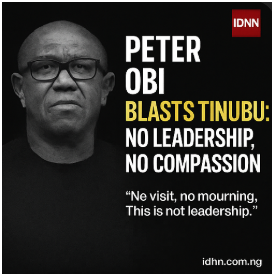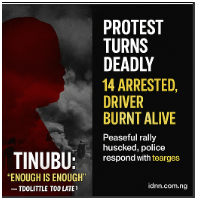BENUE MASSACRE: 200 DEAD, 6,000 DISPLACED AS NATION MOURNS LEADERSHIP WITHOUT EMPATHY
By IDNN Political + Security Desk
The heartland of Benue State has been shattered again. What began as a night of coordinated terror in Yelwata and Daudu spiraled into one of Nigeria’s deadliest non-combat civilian massacres in recent memory — over 200 lives lost, entire families burnt alive, and more than 6,000 people displaced, according to security officials, locals, and emergency agencies.
In scenes described as “apocalyptic,” gunmen suspected to be armed herders struck the Guma Local Government Area on Friday night, setting fire to stalls and homes, slaughtering civilians, and leaving a trail of ash and blood. Eyewitnesses described a dual-pronged ambush, with attackers surrounding communities from both eastern and western axes.
“They poured petrol on stalls where displaced families slept, then lit it,” said Matthew Mnyan, a community leader. “Entire families were burnt. Over 200 are dead.”
GUNFIRE, GRIEF, AND GRAVES: A FAILED SECURITY SYSTEM
Initial police reports confirmed 45 dead. But survivor accounts, medical officials, and community leaders report far higher numbers. At least 20 of the 46 victims rushed to the hospital died. Several corpses were burnt beyond recognition, complicating identification efforts. A former senior aide to Governor Ortom, Prince Aondona Isiaka, said 23 of his relatives perished in the attack.
The military confirmed two soldiers and one civil defence officer were killed. The Nigerian Army and NSCDC, deployed to intervene, walked into an ambush. Police said some assailants were “neutralised,” but locals insist the scale of the massacre shows how helpless state security forces remain against organized violence.
Across North Bank in Makurdi, another attack days earlier left 25 dead. Benue bleeds, again and again.
TINUBU ACCUSED OF SILENCE AND ABSENCE

The federal government’s response? Critics say it’s been alarmingly absent.
Peter Obi, 2023 Labour Party presidential candidate, unleashed a scathing critique, accusing President Bola Tinubu of “leadership without empathy.” In a statement titled “What Cannot Be Hidden in Leadership,” Obi condemned Tinubu’s failure to visit or address the affected families directly.
“Over 200 Nigerians were massacred. Again, no presidential visit. No national mourning. No leadership presence to comfort the grieving. This is not leadership,” Obi said.
Citing global examples, Obi compared Nigeria’s silence to how leaders in India and South Africa visited disaster sites within hours. He called for a rejection of “tribal voting” and urged Nigerians to prioritize leaders with competence, capacity, character, and compassion — the “4 Cs” he says are missing.
A GOVERNOR’S ANGUISH AND A GENERAL’S VISIT
Governor Hyacinth Alia, under immense pressure, admitted in a TV interview that armed herders entering Benue without cattle — but with AK-47s and AK-49s — were behind the attacks. He blamed porous borders with Nasarawa and even Cameroon for the influx.
“They don’t even come with cows anymore,” Alia said. “They kill and leave. After a week, new people move into the land.”
On Sunday, Chief of Defence Staff Gen. Christopher Musa landed in Yelwata, vowing military resolve. The Inspector-General of Police is expected in the state. Yet for many, these visits feel belated.
Former Senate President David Mark warned that if government fails to act, Benue citizens may resort to self-defense.
“Government must rise, or risk leaving the people with no option,” Mark warned. “This cycle of killings is senseless, tragic, and unacceptable.”
HUMANITARIAN DISASTER: 6,527 DISPLACED, CHILDREN DYING
The National Emergency Management Agency (NEMA) reports over 6,527 displaced individuals, with 3,000 requiring urgent food, water, and medical assistance. Among the displaced are 82 pregnant women, 252 lactating mothers, and 657 children.
Rescue teams say ongoing insecurity hinders accurate casualty counts. A new IDP camp has been opened at Makurdi International Market, supported by SEMA, UNHCR, Red Cross, and IOM.
Calls for blood donations are urgent. Relief materials are trickling in, but many survivors remain traumatized, displaced, and angry.
MOURNING, PROTESTS, AND POLICE VIOLENCE

The outrage spilled into the streets. Youths blocked the Lafia-Makurdi highway, demanding justice. On Sunday, police used teargas to disperse protesters who reportedly tried to confront the state’s deputy governor.
In a shocking twist, 14 protesters were arrested after allegedly hijacking the demonstration, setting a truck and its driver ablaze in Apir, on Makurdi’s outskirts.
Police spokesperson DSP Udeme Edet emphasized the right to protest must remain peaceful but warned of zero tolerance for violence.
THE COST OF LEADERSHIP WITHOUT COMPASSION
Benue’s tragedy has become Nigeria’s shame — not just for the blood spilled, but for the silence that followed it. From the corridors of power in Abuja, empathy seems in short supply.
In his televised address, President Tinubu said: “Enough is enough.” He called for dialogue, restraint, and reconciliation — but many believe it’s too little, too late.
What the nation witnessed in Benue wasn’t just mass murder. It was the unmasking of a leadership vacuum in the face of repeated humanitarian horrors. As one survivor put it: “They came with guns. We had only prayers.”

